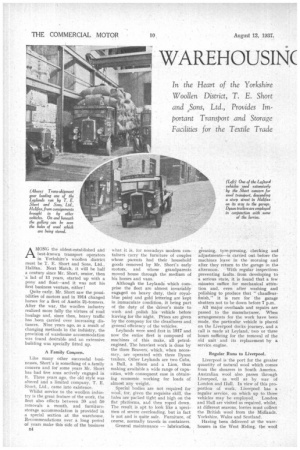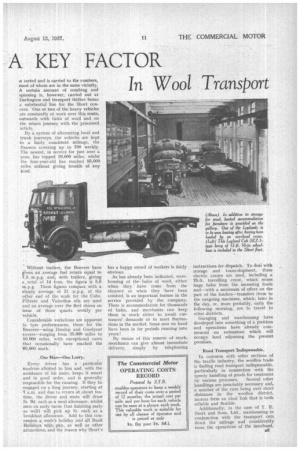WAREHOUSIN( A KEY FACTOR
Page 38

Page 39

If you've noticed an error in this article please click here to report it so we can fix it.
In Wool Transport In the Heart of the Yorkshire Woollen District, T. E. Short and Sons, Ltd., Provides Important Transport and Storage Facilities for the Textile Trade AMONG the oldest-established and best-known transport operators in Yorkshire's woollen district must be T. E. Short and Sons, Ltd., Halifax. Next March, it Will be half a century since Mr. Short, senior, then a lad of 13 years, started up with a pony and float—and it was not his first business venture, either!
Quite early, Mr. Short saw the possibilities of motors and in 1914 changed horses for a fleet of Austin 24-tonners. After the war, the woollen industry realized more fully the virtues of road haulage and, since then, heavy traffic has been carried over increasing distances. Nine years ago, as a result of changing methods in the industry, the provision of warehouse accommodation was found desirable and an extensive building was specially fitted ,up.
A Family Concern.
Like many other successful businesses. Short's is something of a.family concern and for some years Mr. Short has had five sons actively engaged in it. Three years ago, the old style was altered and a limited company, T. E. Short, Ltd., came into existence.
Whilst service to the woollen industry is the great feature of the work, the fleet also effects between 30 and e'0 removals a month, and furniturestorage accommodation is provided in a special section at the warehouse. Recommendations over a long period of years make this side of the business 84 what it is, for nowadays modern containers carry the furniture of couples whose parents had their household goods removed by Mr. Short's early motors, and whose grandparents moved house through the medium of his horses and vans.
Although the Leylands which comprise the fleet are almost invariably engaged on heavy duty, their royalblue paint and gold lettering are kept in immaculate condition, it being part of the duty of the 'driver's mate to wash and polish his vehicle before leaving for the night. Prizes are given by the company for the cleanliness and general efficiency of thc vehicles. .
Leylands were used first in 1917 and now the entire fleet is composed of machines of this make, all petrolengined. The heaviest work is done by the three Beavers, which, when necessary, are operated with three Dyson trailers. Other Leylands are two Cubs, a Bull, a Bison and a Lion, thus making available a wide range of capacities, with consequent ease in obtain ing economic working for loads of almost any weight.
Special 'bodies are not required for wool, for, given the requisite skill, the hales are packed tight and high on the flat platforms, and then roped down. The result is apt to look like a specimen of severe overloading, but in fact is not and is quite safe. Furniture, of course, normally travels in containers.
General maintenance — lubrication, greasing, tyre-pressing, checking and adjustments—is carried out before the machines leave in the morning mid after they return to the garage in th4 afternoon. With regular inspections preventing faultsfrom developing to a serious state, it is found that a few minutes suffice for mechanical attention and, even after washing and polishing to produce that "chauffeurfinish," it is rare for the garage shutters not to be down before 7 p.m.
All major overhauls and repairs are passed to the manufacturer. When arrangements for the work have been made, the particular vehicle is placed on the Liverpool docks journey, and a call is made at Leyland, two or three hours sufficing for the removal of the old unit and its replacement by a service engine.
Regular Runs to Liverpool.
Liverpool is the port for the greater quantity of natural wool which comes from the shearers in South America. Australian wool also passes through Liverpool, as well as by way of London and Hull. In view of this proportion of work, Liverpool has a regular service, on which up to three vehicles may be employed. London and Hull arc visited as required, whilst, at different seasons, lorries must collect the British wool from the Midlands, Yorkshire, Wales and Scotland.
Having been delivered at the warehouses in the West Riding, the wool
is sorted and is carried to the combers, most of whom are in the same vicinity: A certain amount of combing and spinning is, however, carried out at Darlington and transport thither forms a substantial line for the Short concern. One or two of the heavy vehicles ate constantly at work over this route, outwards with bales of wool and on the return journey with the processed article.
By a system of alternating local and trunk journeys, the vehicles are kept to a fairly consistent mileage, the Beavers covering up to 700 weekly. The newest, in service for just over a year, has topped 30,000 miles, whilst the four-year-old has reached 85,000 miles without giving trouble of any kind.
Without trailers, the Beavers have given an average fuel return equal to 7,5, m.p.g. and, with trailers, giving a..total of 14 tons, the figura is 5.5 m.p.g. These figures compare with a steady average of 11 m.p.g. at the other end of the scale for the Cubs. Filtrate and Valvoline oils are used and an average over the fleet shows an issue of three quarts weekly per vehicle.
Considerable variations are apparent in tyre performances, those for the Beavers—using Dunlop and Goodyear covers—ranging from 35,000 miles to 50,000 miles, with exceptional cases that occasionally have reached the 60,000 mark.
One Men—One Lorry,
Every driver has a particular machine allotted to him and, with the assistance of his mate, keeps it smart and in good order, and is generally responsible for the running. If they be engaged on a long journey, starting at -7 a.m. and due to return at about teatime, the driver and mate will draw 3s. 9d. each as a meal allowance, whilst men on early turns. (but finishing early as well) will pick up Is. each as a breakfast allowance. Add to this concession .a. week's holiday and all Bank Holidays with pay, as well as other attractions, and the reason why Short's
has a happy crowd of workers is fairly obvious.
As has already been indicated, warehousing of the bales of wool, either when they " have come from the shearers or when they -have been combed, is an important feature in the service provided by the company. There is accommodation for thousands of ' bales, and merchants can keep them in stock either to await customers' demands or to meet fluctuations in the market. Some now on hand have been in for periods running into years!
By means of this reserve of stock, merchants can give almost immediate delivery, simply by telephoning instructions for dispatch. To deal with storage and trans-shipment, three electric cranes are used, including a 75-ft, travelling crane, which seizes huge bales from the incoming loads and—with a minimum of effort on the part of the loaders—transfers them to the outgoing machines, which, later in the day, or, more probably, early the following morning, are to travel to other districts.
Garaging and warehousing have developed into something of a problem and operations have already commenced on extensions which will occupy land adjoining the present premises.
Road Transport Indispensable.
In common with other sections of the textile industry, the woollen trade is finding road transport indispensable, particularly in connection with the speedy handling of goods for treatment by various processes. Several other handlings are invariably necessary and, a number of the runs being over short distances in the woollen district, motors form an ideal link that is both reliable and flexible.
Additionally, in the case of T. E. Short and Sons, Ltd., warehousing in conjunction with the transport cuts down the mileage and considerably eases the operations of the merchant.




















































































